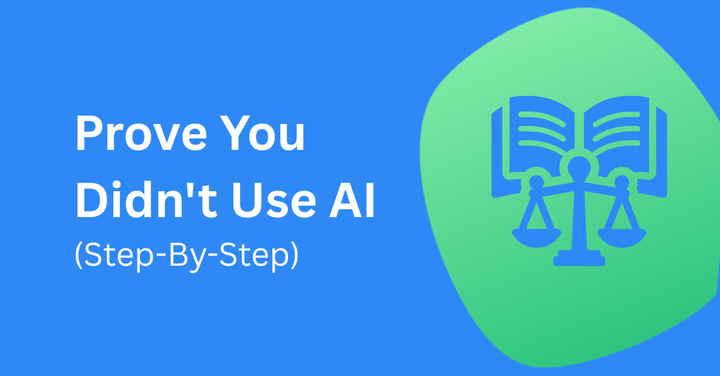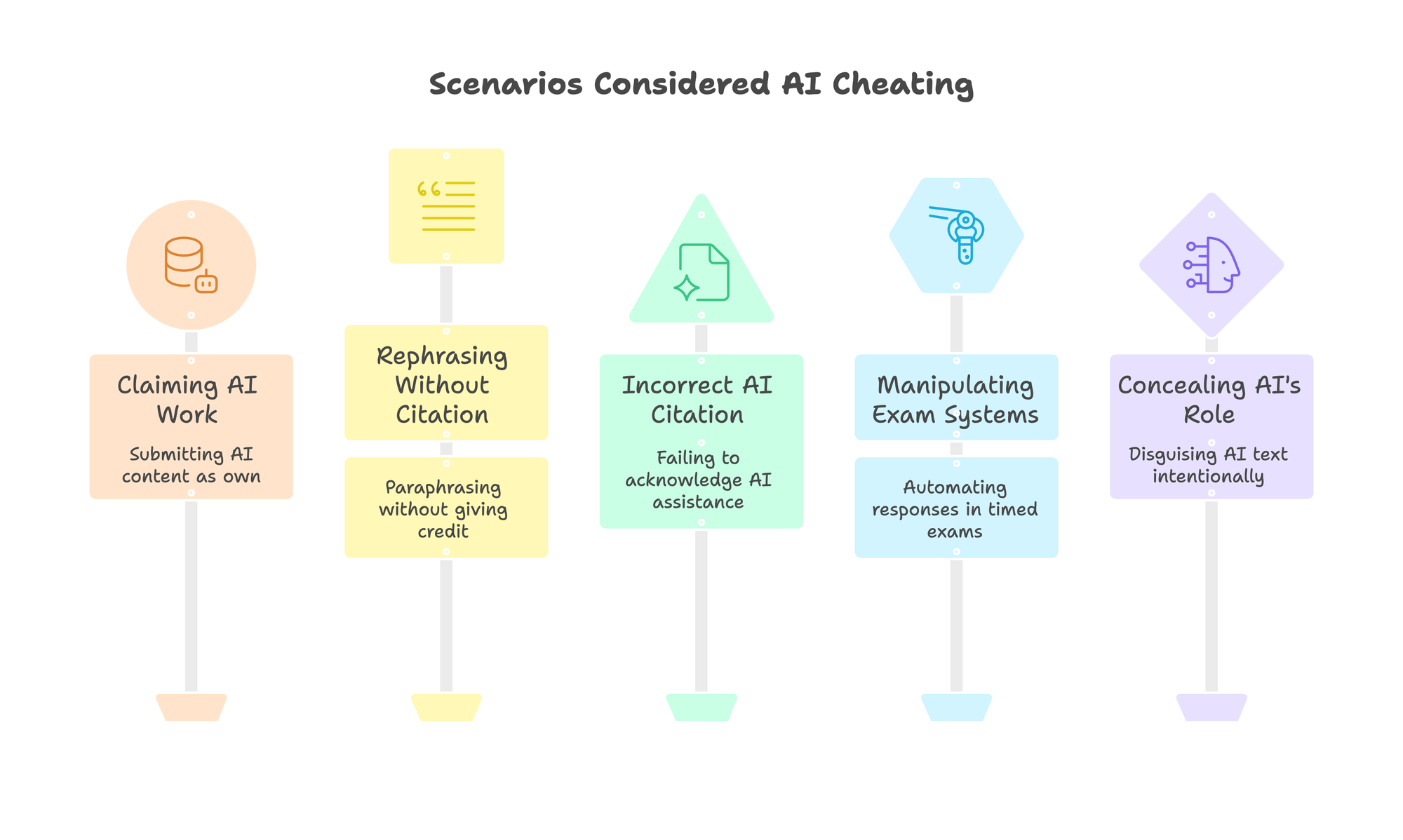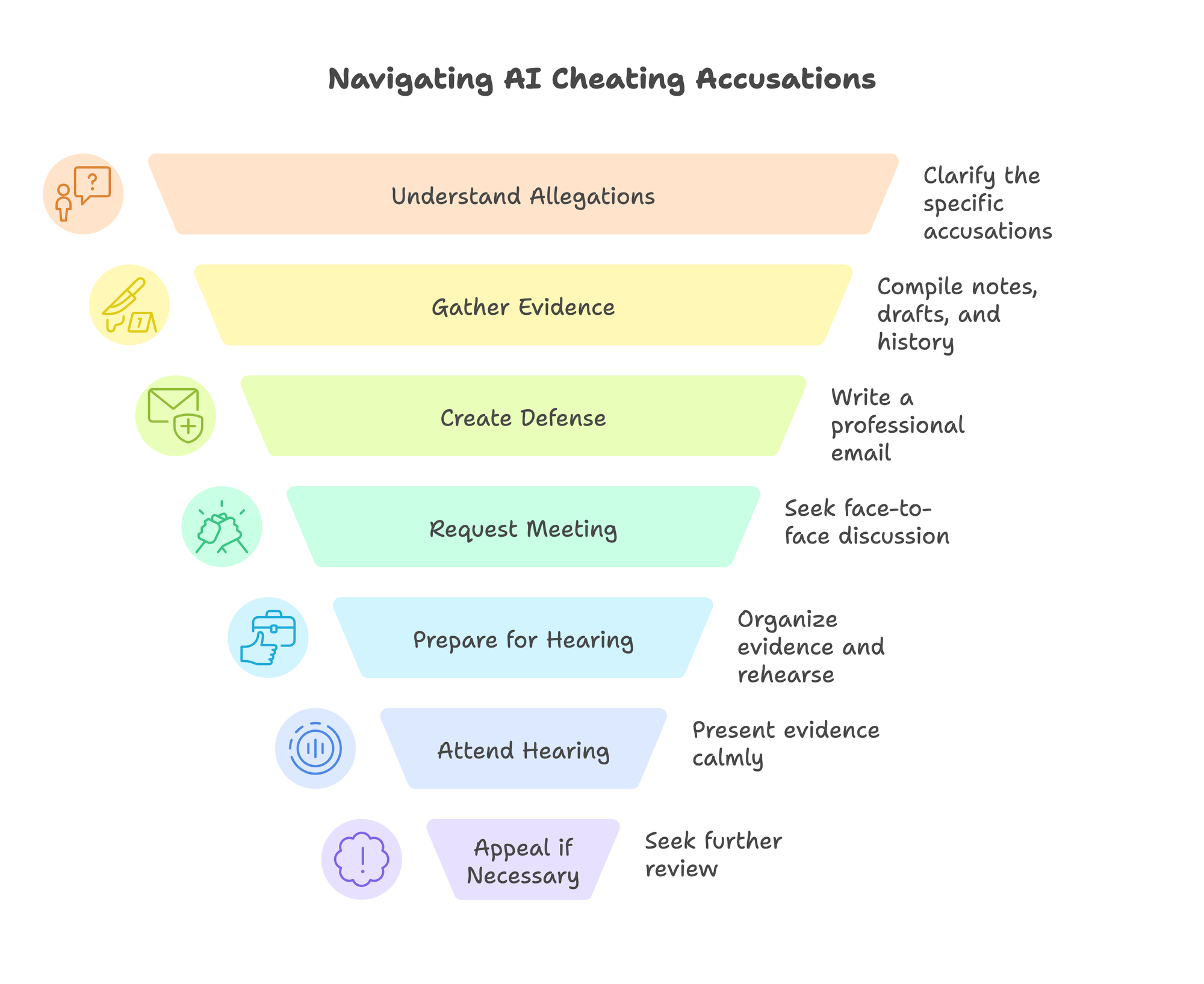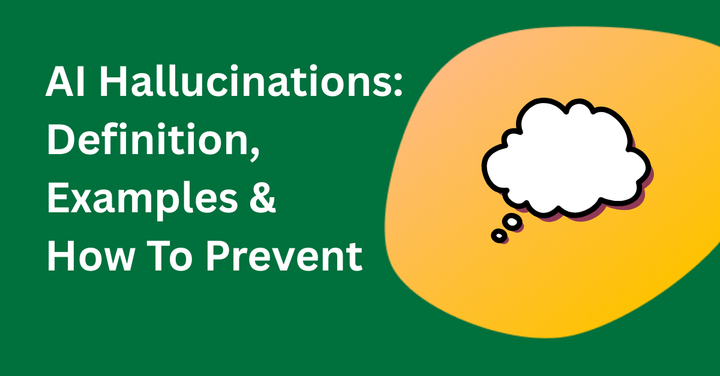Falsely Accused of AI Cheating? How to Fight Accusations & Defend Yourself
If you’ve been flagged for AI cheating, even though you wrote everything yourself, this guide shows how to respond by gathering the right evidence, as well as using GPTZero’s Writing Report to prove your authorship.

It’s hard to understand how deeply stressful being falsely accused of AI cheating can be, until it happens to you. Yet it’s a growing issue: one Guardian investigation found almost 7,000 confirmed cases of students caught using AI tools to cheat in 2023-24, or around 5.1 in every 1,000 students, which is a big rise from 1.6 per 1,000 the previous year – and as proven cases become more common, so too do reports of students being falsely accused of using AI.
Getting accused of using ChatGPT or AI to write an essay can be devastating. The accusations often start with AI detector scores or a professor suspecting artificial intelligence plagiarism. However, no AI detector is perfect, and knowing how to prove you didn’t use AI is becoming more of an indispensable skill in today’s world.
If you’ve been accused of plagiarism (but didn’t cheat!) then this guide covers everything you need to know to fight for your innocence.
Working on an essay? Use GPTZero’s Writing Report as it automatically saves your writing process, which is strong evidence if your work is ever questioned.
What Is AI Cheating?
AI cheating is using generative AI tools such as ChatGPT or Claude to either entirely create or heavily rewrite your academic work without proper disclosure. These days, most institutions treat this as a form of academic misconduct, on the same level as plagiarism.
The frustrating thing is that since these are the early days of AI in the classroom, every school’s policy (if it exists) tends to be different. As The Washington Post’s technology columnist Geoffrey A. Fowler put it, “Just remember: This is new to everyone.” While it’s a difficult position for students to be in, it’s also a new and thorny challenge for teachers who are trying to figure out when and whether to trust their students or AI detection software.
Some teachers are fine with using AI for minor things, like checking your grammar, while others are keen to ban it outright. However, the only thing for certain is that the rules are changing faster than a lot of classroom policies can keep up, meaning more students are vulnerable to ending up in a grey area, in situations that could be treated as AI cheating.
Common Scenarios Considered as AI Cheating
- Claiming AI-generated work as your own: If you use a generative AI tool to write an essay or report, and submit it as entirely your own work, this is typically treated as plagiarism. Even if it was only sections (not the whole thing) that you edited or rewrote, you still have to declare AI assistance according to your school’s policy.
- Rephrasing existing content with AI: If you use an AI tool to paraphrase someone else’s writing without proper citation, that is still plagiarism. AI models don’t “own” text, but the underlying ideas and structure belong to the original author.
- Failing to cite AI or citing incorrectly: If AI tools helped you draft or edit material, most institutions now require an acknowledgment. This could be something like: “Portions of this text were assisted by ChatGPT.” If you don’t provide that citation, this can be suspicious, especially if it’s wildly different from your typical writing style.
- Manipulating online examination systems: Using AI to answer online quizzes or automate responses in a timed exam environment is a serious academic offense, and universities treat this as equivalent to using an unauthorized device.
- Concealing AI’s role: If you attempt to “humanize” or disguise AI text (by using paraphrasers to hide AI patterns), that can be intentional deception. Even if the original intent is harmless, like improving grammar, it can still be treated as a breach of academic integrity.

Consequences of Getting Caught Cheating
Each institution has its own rules, but the penalties usually get more serious the worse the offence. This is an idea of how they could escalate, though of course it depends on the policy at your specific institution:
As unfair as it sounds, even a false accusation can carry emotional and reputational costs, especially if word spreads among peers or professors, and this is why documentation and a well-prepared response matters more than ever.
Step-by-Step: What to Do When Accused of AI Cheating
You’ve just been accused of AI cheating. It’s a shock. It’s normal that now might be a hard time to think perfectly rationally. However, despite this, the main thing to remember is to respond with facts instead of emotion. When you’re overwhelmed, it helps to take things one step at a time, and this is a step-by-step approach you can follow.

Get very clear on exactly what you’re being accused of
Ask for a written explanation of the specific allegations, because understanding exactly what triggered the accusation helps you tailor your defence. Was the suspicion based on an AI detector score? Which section of your work is in question? Are you being accused of an isolated incident, or of a pattern?
Round up your evidence
Start compiling everything you used to create the assignment in question:
- Notes, outlines, and drafts
- Version history from Google Docs
- Screenshots of your research process
- Chat logs, whether it’s on an official school forum or even just via time-stamped text messages (if you discussed the topic with classmates or tutors)
Version history is particularly powerful because it shows timestamps and gradual changes. If you were using GPTZero’s Writing Report while drafting, that’s even better as it gives a complete breakdown of your writing process (such as edits and bursts), which is exactly the kind of evidence that helps resolve misunderstandings quickly.
Create a detailed defense
Write a short and professional email to your instructor or disciplinary committee. Stick to the facts and keep emotions out of it: the tone you want to lead with is one of cooperation. To give you an idea of what a note could look like, think of something like this:
Dear (Instructor),
I was recently informed that my assignment was flagged for potential AI use, and I want to state that I wrote this work independently and can provide version history and draft notes as evidence. Please let me know how I can submit this supporting documentation.
Sincerely,(Your name)
Ask for a meeting
Request a meeting with your teacher or academic integrity office since an honest face-to-face conversation often resolves misunderstandings much more effectively than endless email chains. During the meeting, make sure you bring printed or digital evidence, and use them to guide the other person through your writing process. If you used GPTZero Writing Report, bring the replay or PDF export.
Prepare for the hearing
If your case escalates to a formal committee, treat it like a professional presentation and make sure to rehearse your statement, as well as organizing your evidence chronologically. You should also practice answering questions, and once again, leaving emotion out of it and deliberately avoiding getting into an argument.
Go to the hearing
You have the right to a fair process. Bring a support person if permitted, even a classmate or family member who can take notes. Above all, stay calm and focus on explaining your process step by step: how you researched, drafted, edited, and submitted your work.
Appeal if you need to
If the outcome still feels unfair, most institutions allow appeals. Your appeal should be written and include:
- A summary of the initial accusation
- Evidence that supports your authorship
- Procedural concerns
- A respectful request for review
Keep copies of all communications in case the issue escalates further.
Move on from it
False accusations can be emotionally draining, and it’s worth seeking support from friends, peers, counsellors, or your academic advisor. There is also a growing amount of anecdotes being shared on social media: Jess Mirabelli from Melbourne, Australia, shared her experience of being falsely accused of using AI here.
@jesssspov do not panic if you’ve been FALSELY accused of using ai in your uni assignments ‼️ here are my tips if this is you #uni #ai #assignments #teaching #university #student #studying #unitips #studyhack #studytips
♬ original sound - jess 🧸
Who Can Help You with an AI Cheating Accusation?
Another key thing to remember is that you don’t have to handle it alone. The most important thing is to reach out for support early.
Academic Advisors
Most universities have academic integrity officers or advisors, although they might go by a title such as student conduct officer, programme director, course leader, or someone in the Dean of Students’ office. A critical thing to note is that many academics themselves are trying to understand how to manage AI-related cases responsibly.
In this video, Dr Lyndon Walker mentions he is advising on the topic to be helpful for students but also for academics, “so that they know what is going on… and can better handle situations where one of these tools has identified a piece of work as being possibly generated by AI.”
As a recent Forbes article questioned, “Schools worldwide are grappling with the implications of these tools in the classroom. As AI is hailed as an innovative tool by some and condemned as plagiarism by others, how should schools and educators adapt?”
Legal Support
If the accusation could affect something big, like a scholarship or your visa, it might be worth speaking to a lawyer like Richard Asselta, who exclusively focuses his practice in the area of education law issues.
“As a defense attorney specializing in academic misconduct, I’ve seen firsthand how schools are increasingly scrutinizing AI-generated content. Professors are becoming more adept at spotting AI usage, and understanding how they detect it, and how to respond, is crucial to protecting your academic future,” he says.
“The first thing to do is stay calm,” he advises. “Don’t panic and don’t make statements that could harm your case. Professors are sympathetic to students, but they are also bound by academic integrity policies that must be enforced. Stay composed, and consider your next steps carefully.”
Psychological Support
False accusations can take a toll and cause stress as well as persistent anxiety. Many campuses offer free or low-cost counselling, and this is exactly the kind of moment those services are there for. Being accused doesn’t mean you’re guilty and having emotional support from a third party can go a long way in helping you deal with this process.
Best Tool to Detect AI
Educators often rely on AI detectors to make initial judgments. But it’s important to understand how these tools work, as well as their limitations.
How AI Detectors Work
AI detectors work by analyzing how text is written, its wording, rhythm, and structure, to figure out whether it was created by a human or an AI. They look for patterns like how predictable the writing is (called perplexity) and how much it varies in length and tone (i.e. natural language processing) to spot the difference between natural human expression and AI’s more uniform style.
No detector is perfect as they can make mistakes, especially with short, edited, or mixed pieces of writing, so human judgment is always part of the process.
GPTZero’s Approach
At GPTZero, we work directly with educators to help them interpret results in context. In fact, a key tool we recommend to our community for tracking the progress of a writing piece is GPTZero’s Writing Replay, which shows exactly how a piece was written, edited, and pasted.
Instant replay means you can see the writing process exactly as it unfolded, and there isn’t any lag when you’re reviewing the piece, which is useful in settings if you need to walk through the writing process in real time.
Activity insights show key behaviours like frequent edits and writing bursts, demonstrating how the piece came together. Also, the Writing Report has built-in AI detection, which flags large pastes and unnatural text.
Sawyer demonstrates how GPTZero Writing Report works in practice:
@studywithsawyer This new writing report feature is stopping AI #writing #college #ai #gptzeroambassador #gptzeroad
♬ original sound - Sawyer
Conclusion
Getting wrongly accused of AI cheating can be intensely stressful and time-consuming, and it is happening more and more. Hopefully, by taking into account the steps outlined above, you can equip yourself with the tools you need in order to fight back against any false accusations. Most importantly, making a tool like GPTZero’s Writing Report part of your everyday writing process means that you automatically have that layer of protection or safety net going forward.
FAQ
- How Do Professors Identify AI-Generated Texts? Professors have a sense of what they might expect from your work, and they often suspect AI-generated writing when something feels off, such as the tone, which might not sound like your usual work. If they’re unsure, they might run it through an AI detector or ask you a few questions about how you wrote it. Ideally, teachers only use these tools as part of a broader context.
- Are AI detectors Reliable? AI detectors are improving, but there is no AI detector in the world that is completely perfect. Detectors look for patterns in language. This is why responsible teachers treat detector results as clues, instead of definite proof, and always pair them with their own judgment.
- Tips for Fair AI Use: Using AI responsibly comes down to honesty and intention, which is why you need to make sure you check your school’s policy and always keep drafts to show how your work developed, or use a tool like GPTZero’s Writing Report as an automatic part of your work process.


